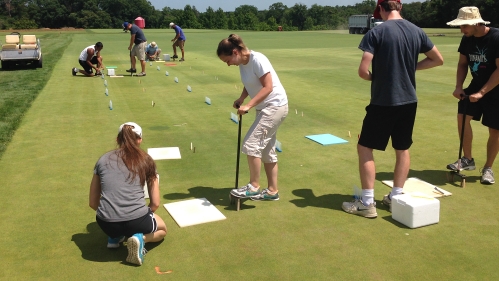
About the Turfgrass Science Certificate Program
The Turfgrass Science Certificate is designed for students with an interest in plant pathology, entomology, weed and soil science, breeding, physiology, or the management of turfgrass species in aesthetically pleasing landscapes, athletic fields, golf courses, and parks. Opportunities in turfgrass science extend well beyond the world of sports to include jobs in lawn care, pest management, private consulting, irrigation design and installation, research, and sales and marketing within the green industry.
This certificate will appeal to students with an interest in environmental enhancement as well as the preservation of quality recreational areas. Students will gain an understanding of strategies for the identification and control of turfgrass pests, soil health, water and nutrient management, approaches to generating new varieties of turfgrass, and the development of turf management practices that are practical, environmentally sound, and sustainable.
Faculty within the Rutgers Turfgrass Program have extensive contacts throughout the green industry and can assist students to obtain paid summer internships and job placements domestically and abroad that can provide real-world work experience and employment opportunities after graduation. Students will also have an opportunity to apply for scholarships and participate in laboratory and field research.
Requirements for the Turfgrass Science Certificate Program (25–28 credits)
Recommended Prerequisites (Depending on Requirements for Coursework):
One semester of biology or advisor approval
11:776:242 Plant Science
11:776:382 Plant Physiology
Plant Science Fundamentals (6 credits)
11:776:302 General Plant Pathology (3)
11:776:402 Introduction to Weed Science and Management (3)
Soils (6–7 credits)
11:776:440 Soil Fertility (3) OR
11:375:360 Soils and Water (4)
AND
11:776:404 Soil Management for Sports Fields and Landscapes (3)
Required Turfgrass Classes (7 credits)
11:776:304 Turfgrass Management (4)
11:776:408 Turfgrass Pest Science (3)
Practical Experience (3 credits)
11:776:495,496 Special Problems in Plant Science (by arrangement): an advisor-approved internship focusing on an area of turfgrass science
Electives (3–5 credits) Choose 3 to 5 Credits of the Following:
11:776:311 General Plant Pathology Laboratory (1)
11:776:389 Applications of Irrigation (2)
11:776:406 Plant Breeding (4)
11:370:350 Agricultural Entomology and Pest Management (3)
11:375:360 Soils and Water (4) (if not taken above)
or other advisor-approved elective
Learning Goals
Learning goals for the Turfgrass Science certificate align closely with program goals for the plant science undergraduate program (technical proficiency, context, communication, and critical thinking). Students completing program requirements will be able to:
- Identify and define the major species of turfgrass, their pests, and accompanying soil, water, and nutrient characteristics [technical proficiency];
- Define the general principles of entomology, pathology, weed science, and pest control within the context of a turfgrass ecosystem [context];
- Describe the concept of integrated pest management and how it applies to turfgrass systems [communication]; and
- Develop innovative turfgrass management strategies that are practical, environmentally sound, and sustainable [critical thinking].